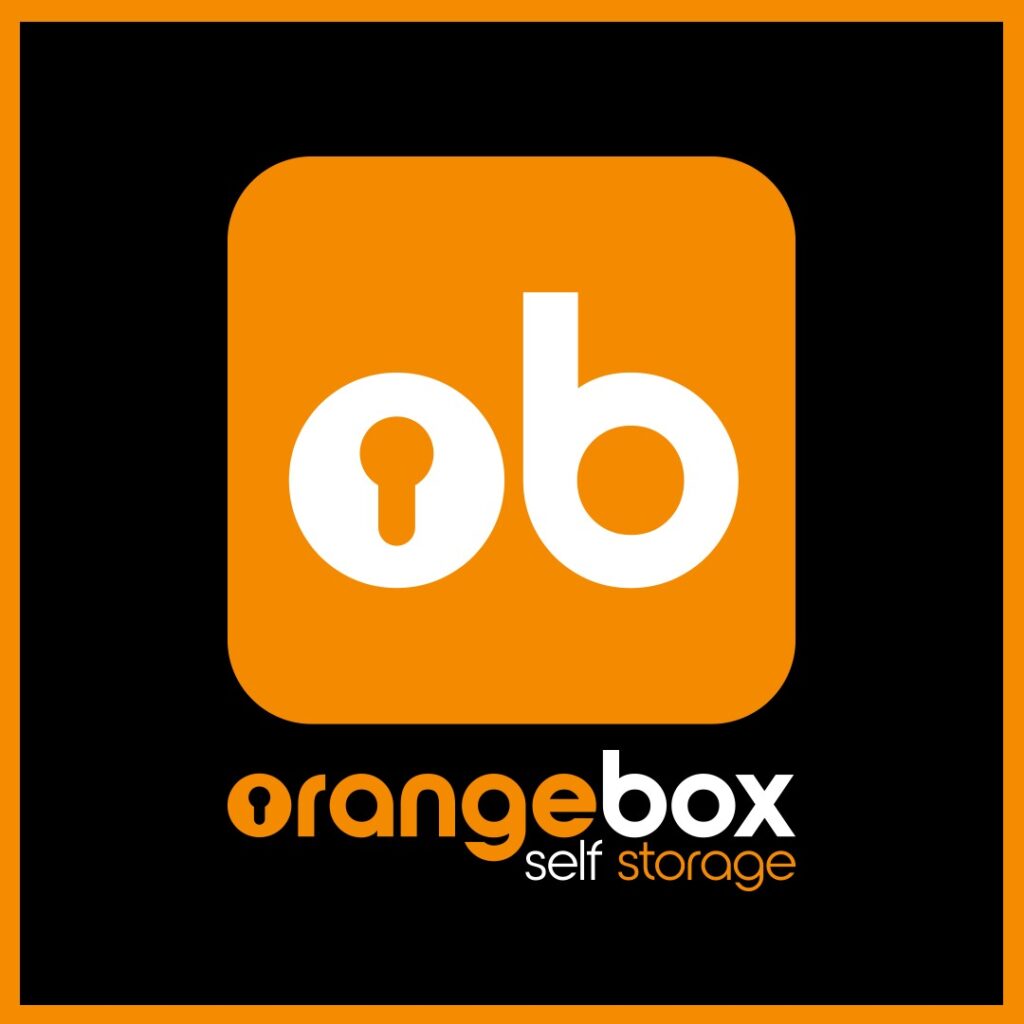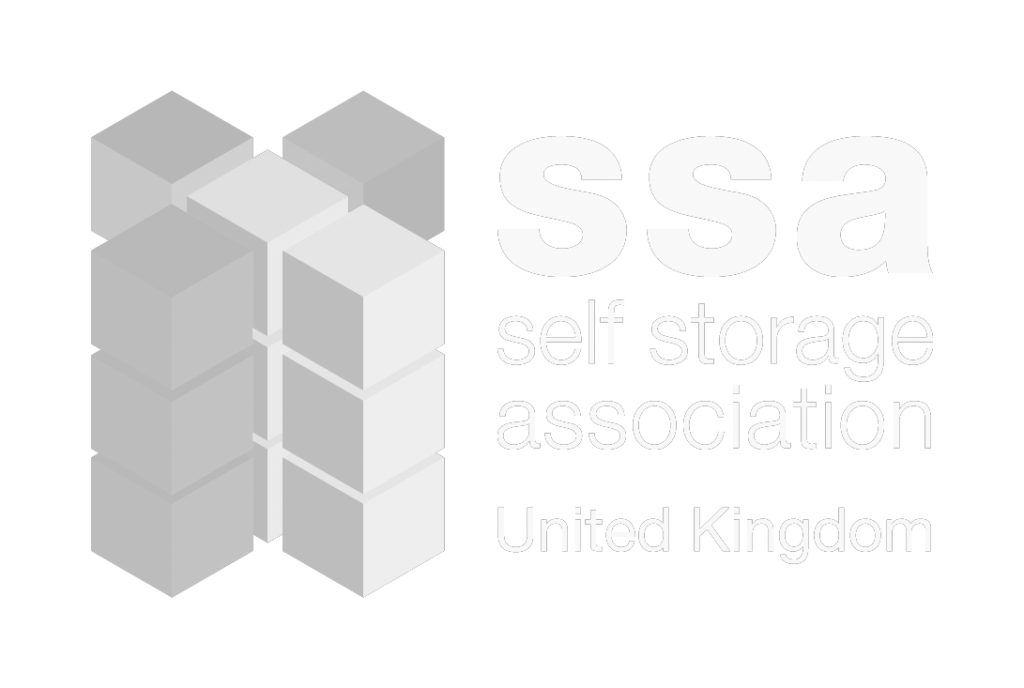Let's be honest, the search for “container storage near me” usually kicks off during some of life’s most stressful moments. Whether you’re moving house, growing your business, or just desperately trying to reclaim your living room, the right storage solution is about more than just finding a metal box. It’s about securing a flexible, affordable extension of your home or workplace that actually makes life simpler.
Why The Right Local Storage Is a Game Changer
When you’re juggling a dozen other things, the last thing you need is a complicated storage situation. Container storage has quickly become the go-to for thousands across the UK for one simple reason: it’s a straightforward, cost-effective answer to a very common problem. It’s a practical choice that fits a huge range of scenarios.
Think of a local tradesperson who needs a secure lock-up for their tools and materials but can’t justify the cost of expensive commercial premises. Or a family caught in a property chain, needing a safe haven for their entire household’s contents between moving dates. These aren’t rare situations; they're everyday challenges where having accessible, local storage makes all the difference.
The Growing Demand for Secure Space
The need for this kind of flexible space is undeniable. Container storage is a massive part of the UK's self storage industry, which now turns over around £1.2 billion. In fact, container-based options account for about 39% of all storage types offered across the country's 2,915 facilities. That popularity tells you everything you need to know about their practicality and availability. You can find out more about the surge in container storage from recent industry reports. This growth isn't just a trend; it reflects a genuine demand for dependable, local storage that people can trust.
Choosing the right local facility isn’t just about finding the cheapest price. It’s about finding peace of mind, knowing your belongings are secure, accessible when you need them, and managed by a provider who understands your requirements.
How to Start Your Local Storage Search
Finding the right "container storage near me" takes a bit more than just a quick Google search. To really nail it, you need to think like a local and get specific with your search terms. Forget the generic queries.
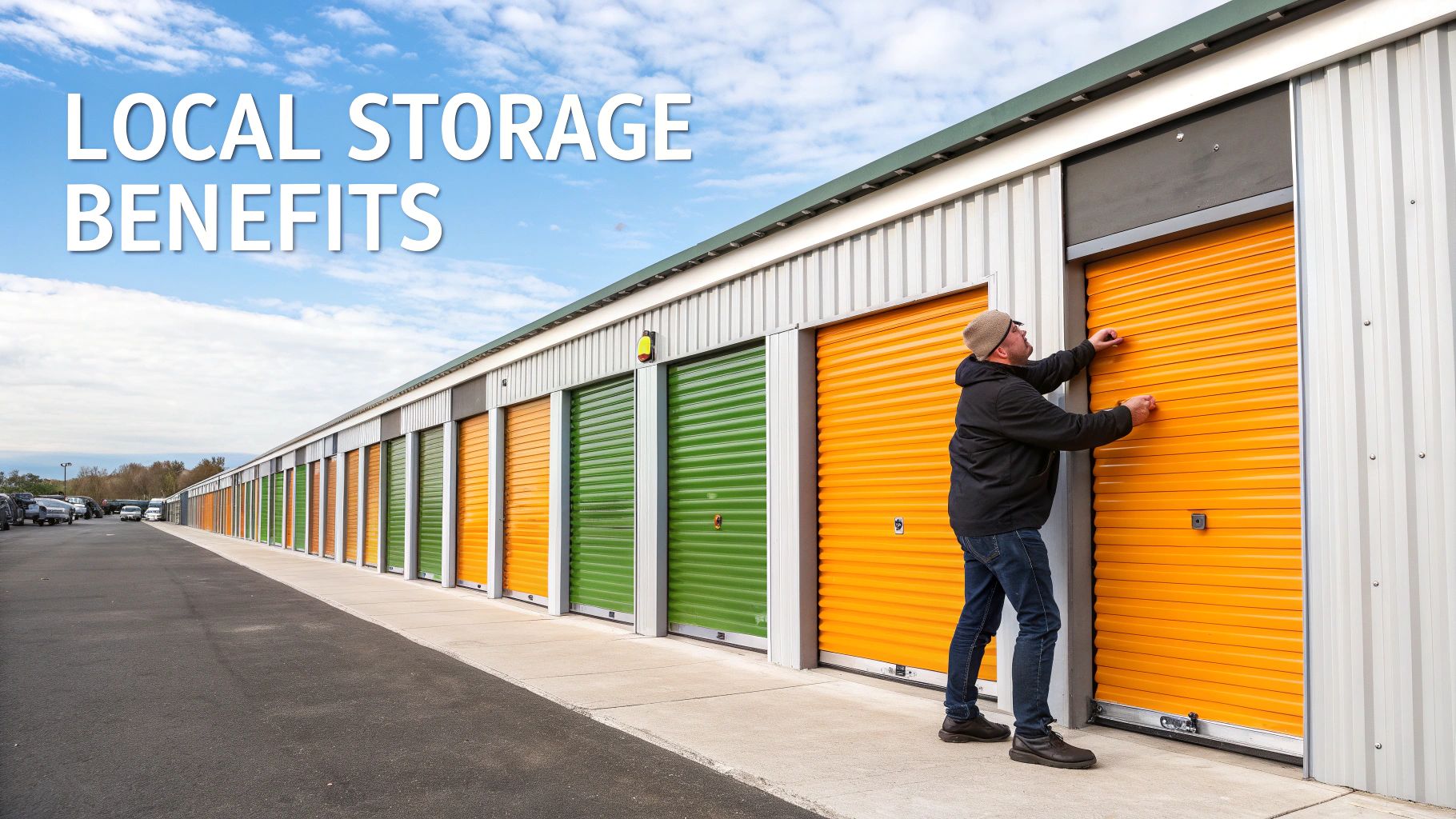
Try typing something like "20ft secure container hire Derby" or even "business inventory storage DE21". Slapping your town or postcode onto the search tells Google you want hyper-local results. This little trick often uncovers those smaller, independent facilities that might not have a massive advertising budget but deliver fantastic service.
Go Beyond the Basic Search
Once you’ve got a shortlist, don't just take their website's location pin as gospel. Fire up an online map and do a virtual "drive-by." What are the main access roads like? Is the facility right on a busy A-road that’s a nightmare to turn into during rush hour, or is it neatly tucked away on a quiet industrial estate?
This kind of real-world context tells you everything about its true convenience, not just how many miles away it is. Let's be honest, a site that’s two miles away through constant traffic is far less convenient than one that’s five miles away with a clear run.
This process is a lot like following a good guide to finding local installation services. In both cases, you have to look past the top search results and dig into the practical details of accessibility and reliability.
Tap into Community Knowledge
Sometimes, the best recommendations come from good old-fashioned word-of-mouth. Never underestimate the value of local online community groups or business networks.
- Local Forums: People love sharing their experiences—both good and bad—with local service providers. It's a goldmine of unfiltered feedback.
- Business Networks: If you need storage for your business, ask other local business owners who they trust with their stock or equipment.
- Trade Associations: For specialised needs, like storing tools and materials, check with relevant trade groups to see if they have any trusted partners.
These platforms can point you towards highly-rated independent providers who care more about their customers than their search engine rankings. And for anyone thinking about a more permanent arrangement, our article on https://orangebox-selfstorage.co.uk/long-term-storage-in-derby-safe-reliable-and-future-proof/ offers some great insights into finding a safe and reliable option.
What to Look For in a Storage Facility
Once you’ve got a shortlist of potential facilities, the real investigation begins. It’s tempting to just compare the monthly price tag, but the true value of a storage service comes down to the details—the things that protect your belongings and make your life easier.
The absolute first thing to check is security. Don't just settle for a mention of "CCTV" on their website. Dig a little deeper. Is the site surrounded by a proper perimeter fence? Is access controlled by a secure electronic gate that needs a unique code or key fob? And what about lighting? You want the grounds to be well-lit, especially if you think you’ll be visiting after dark.
When you're weighing up your options, it's smart to favour facilities that take their security seriously. Look for places that follow essential access control best practices to ensure your items are properly protected.
Access and Site Conditions
Next up, think about accessibility. Your storage unit should work around your schedule, not the other way around. Some facilities offer genuine 24/7 access, which is a lifesaver if you need to grab tools early in the morning or drop off stock late at night. Others might restrict you to office hours, which could be a dealbreaker depending on your needs.
I always recommend visiting a site in person before you commit. It tells you so much. Pay attention to the overall condition of the place. Does it look well-maintained? Are the containers clean, free from rust, and sitting on level ground? A tidy, organised site is often a strong indicator of a professional operation that cares about its customers' property.
A facility's true quality is revealed in its day-to-day operations. Clean driveways, modern security gates, and well-kept units aren't just cosmetic—they are signs of a reliable and secure environment for your possessions.
This simple visual guide breaks down the core steps for picking the right container storage.
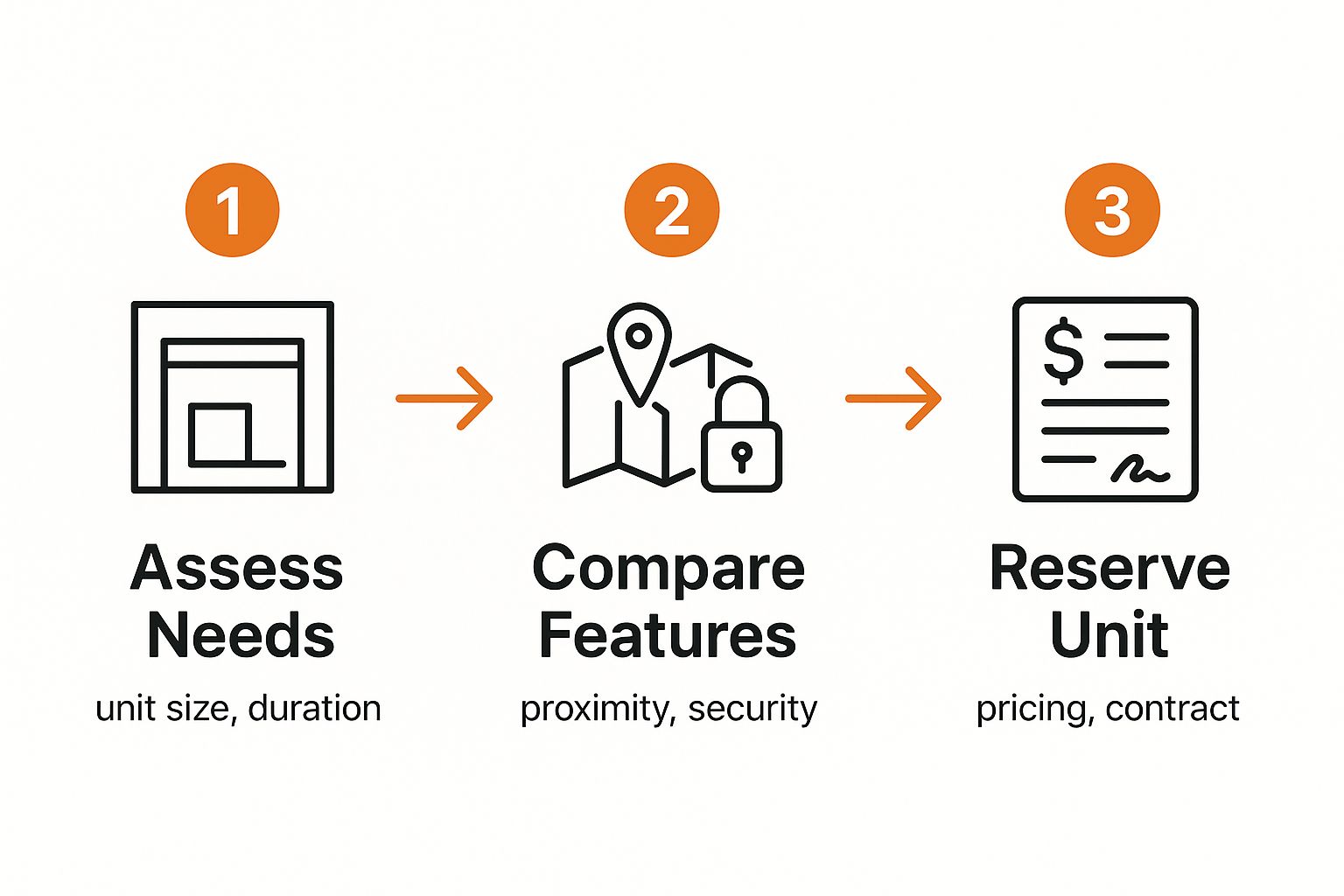
The infographic simplifies the journey, highlighting the key decision points from your initial search right through to booking your unit.
Comparing Local Container Storage Features
To make things easier, use this checklist to compare your top 2-3 local storage options side-by-side. It helps you look beyond the price and focus on the features that really matter.
| Feature | Facility A | Facility B | Facility C |
|---|---|---|---|
| 24/7 Access | |||
| Secure Gated Entry | |||
| CCTV Surveillance | |||
| Well-Lit Grounds | |||
| Clean, Well-Maintained | |||
| Drive-Up Access | |||
| Flexible Lease Terms | |||
| Positive Online Reviews | |||
| Responsive Staff |
Once you fill this in, the best choice for your needs often becomes much clearer.
Finally, think about the type of storage you need. If you're storing anything sensitive to temperature or humidity—like wooden furniture, electronics, or important documents—you’ll need to decide between a container and an indoor unit. Our guide comparing indoor vs container storage options can help you make the right choice based on what you plan to store.
Understanding the True Cost of Storage
The price you see slapped on a website is almost never the final figure you'll pay each month. It's a classic marketing tactic. When you're searching for "container storage near me," you absolutely have to look beyond that headline rate to get a grip on the full financial commitment. Nobody likes a nasty surprise on their first invoice.
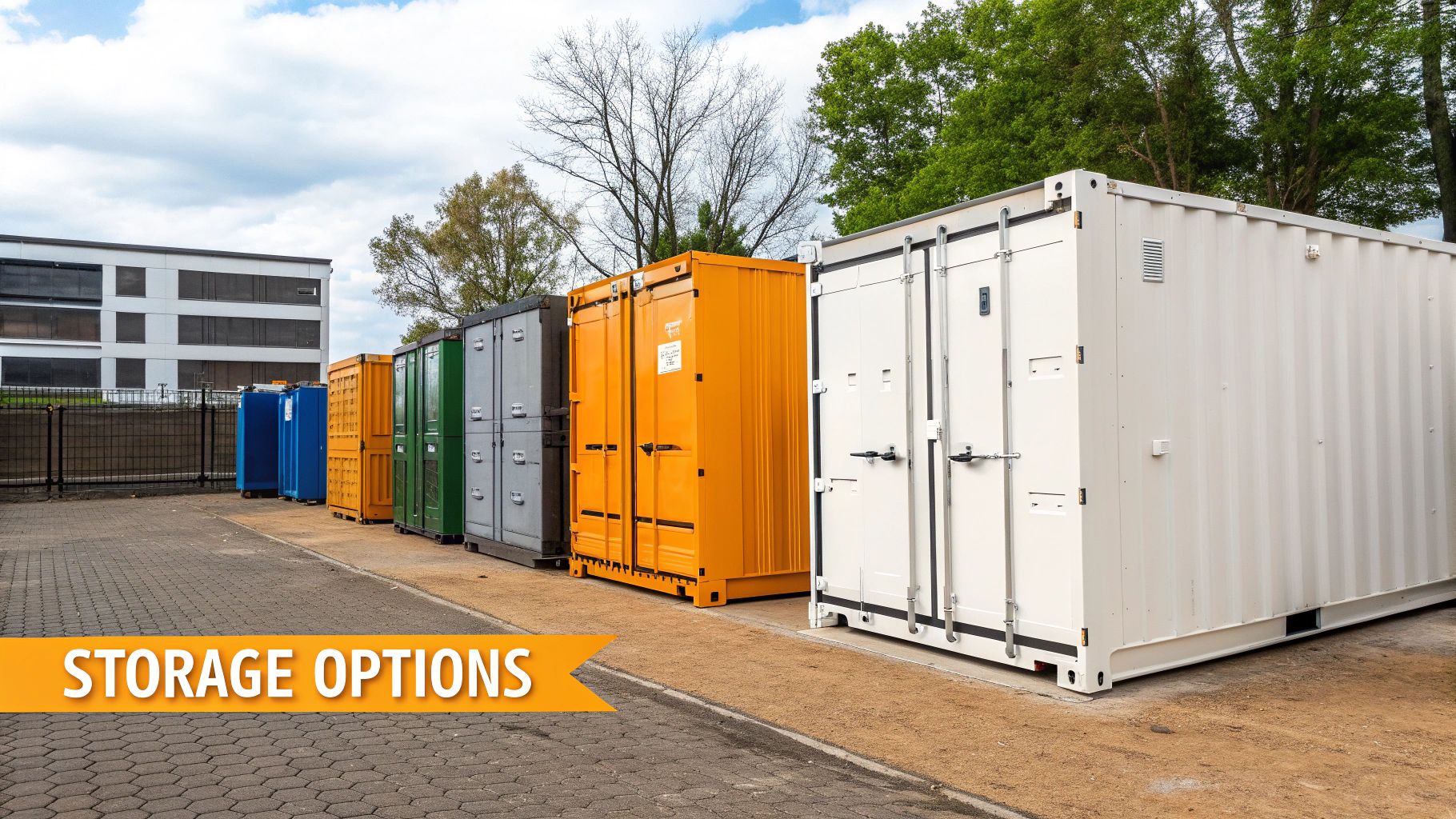
Many facilities have a knack for adding extra charges that can stack up fast. These costs aren't always front and centre, so you've got to know what to ask before you sign on the dotted line.
Uncovering Common Additional Costs
From my experience, the most common extra expenses usually fall into a few key categories. Knowing what they are ahead of time lets you budget properly and compare different places on a true like-for-like basis.
- Mandatory Insurance: Pretty much every facility will insist your goods are insured. They’ll happily sell you their own policy, which is convenient, but it might not be your cheapest option. It’s always worth asking if you can use your own third-party insurance, but be prepared for this to be a required add-on.
- Security Deposits: A one-off, refundable deposit is completely standard practice. This is their safety net against potential damage or unpaid rent, but it’s still an upfront cost you need to be ready for.
- Lock Requirements: You’re going to need a seriously good lock. Some sites will insist you buy their specific model, which is often a heavy-duty container padlock designed for maximum security.
- Admin Fees: Don't get caught out by initial setup or administrative fees. It's usually a one-time charge when you open your account, but it's another thing to add to the initial total.
Before you commit to anything, ask this one critical question: "What is the total drive-away cost today, and what will my recurring monthly payment be, including all fees and VAT?" This cuts straight through the noise and gives you the real numbers you need.
Getting the full picture of the pricing is a massive part of choosing the right shipping container storage for you. Any provider worth their salt will have no problem breaking down every single cost for you. If they're cagey about it, that's a red flag.
How to Secure Your Ideal Storage Unit
So, you've done your research, weighed up your options, and you're just about ready to pull the trigger. Before you sign on the dotted line, there's one last, crucial step: visiting the facility in person. Photos can be very flattering, but a quick site visit will tell you everything you need to know about what you’re really getting.
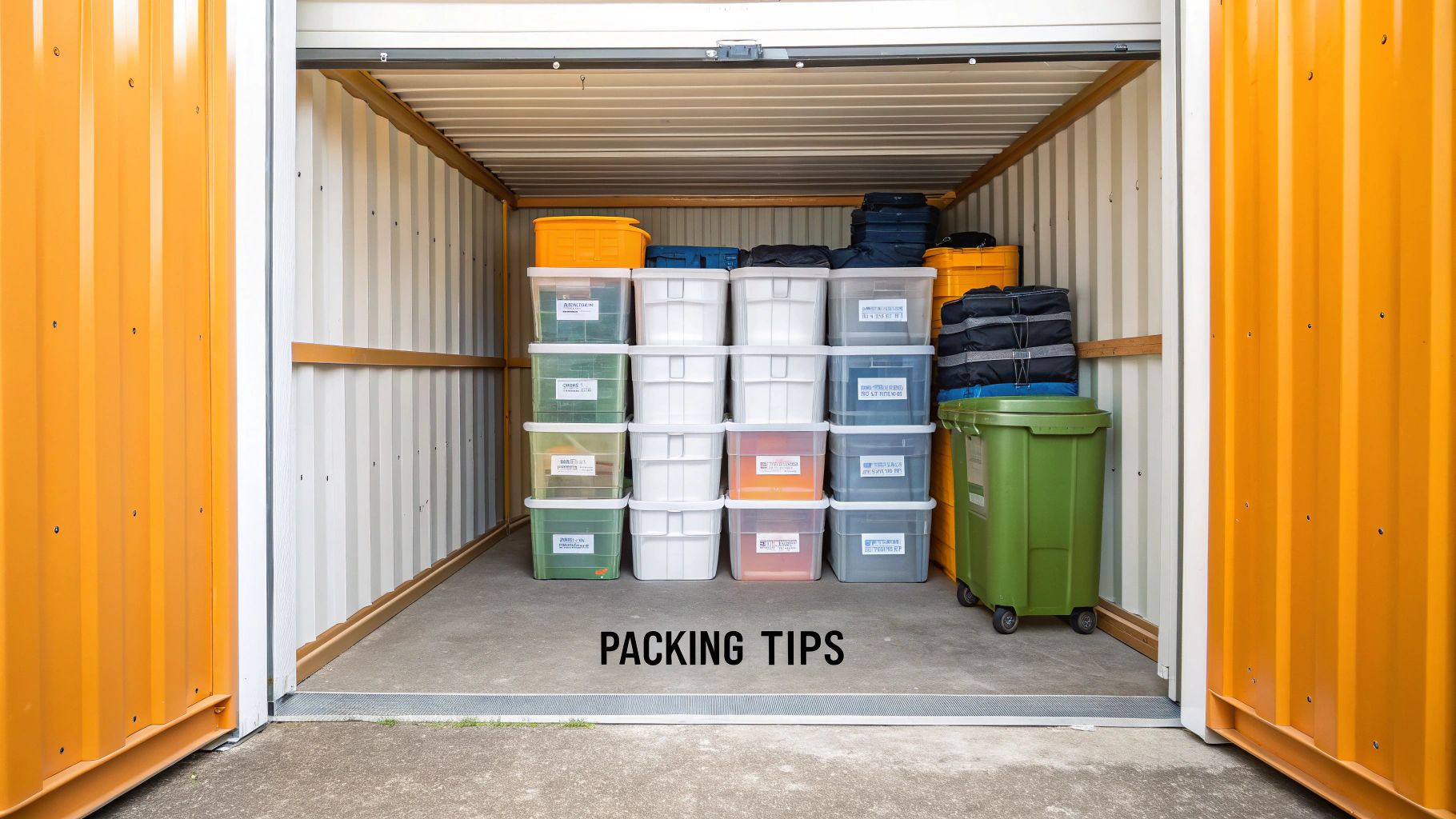
When you’re there, trust your gut. Take a look at the access roads – are they in good nick and easy to get a van down? How does the whole place look? Pay attention to the general cleanliness and state of repair of the containers and the site itself. A professional, well-looked-after site is nearly always a secure and dependable one.
The Final Checklist Before You Commit
As you walk around, have a mental checklist ready. This helps you compare your final options without getting swayed and makes sure you don’t forget any key details.
- Security Integrity: Can you test the main gate? Are the CCTV cameras modern and actually pointing somewhere useful?
- Unit Condition: Get a look at the specific unit you might be renting. Check for any hint of rust, dampness, or damage around the door seals.
- Staff Interaction: If there are staff on-site, have a chat. Are they professional and genuinely helpful? It’s a massive clue about the kind of customer service you can expect.
Once you’re happy with the physical site, the last piece of the puzzle is the paperwork. Most facilities have a pretty simple booking process. You'll usually need some form of photo ID (like a driving licence) and proof of address.
Here’s the most important part: read the rental agreement carefully. Don't just skim it. Look for any clauses about price hikes, notice periods, and what you’re not allowed to store. Getting this clear from the start saves a world of headaches later on.
The self-storage industry is booming, with a projected growth rate of 5.91% through 2034. While this means facilities are getting more professional, it also means contracts can be packed with complex terms. This growth, especially in the South East and North West, is fuelled by everything from housing pressures to business needs, so locking in a fair deal is more important than ever. You can read the full research about these self storage trends to get the bigger picture.
By taking these final steps, you can book your unit knowing you've made the right choice. For a bit more advice, make sure to read our article on the 8 common storage unit mistakes and how to avoid them.
Got Questions About Container Storage? We've Got Answers
Even after you've done your homework, it’s natural to have a few last-minute practical questions. Getting these sorted from the get-go makes the whole experience of renting a storage container smooth and straightforward. We’ve rounded up some of the most common queries that pop up when people are looking for "container storage near me".
What Can I Actually Store in a Shipping Container in the UK?
You can pack it with most of the usual suspects – think furniture, boxes of archived paperwork, tools, or extra business stock. Pretty much anything you’d find in a typical home or small business is fair game.
However, every storage facility has a non-negotiable list of prohibited items, and this is purely for safety and legal reasons.
This list will always ban things like:
- Hazardous materials – that means flammable liquids, dodgy chemicals, or explosives.
- Illegal goods or firearms.
- Perishable food that could attract pests (and nobody wants that).
- Live plants or animals.
Before you start loading up the van, always double-check the prohibited items list in your rental agreement. It’s far better to be certain than to accidentally break the rules.
Do I Need My Own Insurance for Container Storage?
Yes, you almost certainly will. Think of it as a mandatory part of the deal. While most facilities offer their own insurance policies for a small monthly fee, some might let you use your own third-party policy if it meets their criteria.
It’s a common myth that your home insurance will cover your stuff when it’s stored elsewhere. In reality, it will not in most cases. Making sure you have proper coverage for the full value of your belongings is absolutely essential for your peace of mind.
Consider storage insurance your non-negotiable safety net. It’s what protects your valuables against the unexpected, like fire, theft, or damage, ensuring you're not left out of pocket if the worst happens.
How Do I Stop Condensation Inside My Storage Container?
While a good quality container is built to be wind and watertight, condensation can still sneak in when the temperature fluctuates. The best way to minimise the risk is to ensure every single item is bone dry before it goes into storage.
It also helps to leave a small air gap between your belongings and the container walls. This promotes a bit of air circulation. If you're storing for the long haul or have sensitive items like electronics or important documents, grabbing a few moisture-absorbing desiccant pots is a brilliant, low-cost way to keep things dry.
Ready to find the perfect storage solution? At Orange Box Self Storage, we offer secure, accessible, and affordable container storage to meet your needs. Get a free, no-obligation quote online today!


